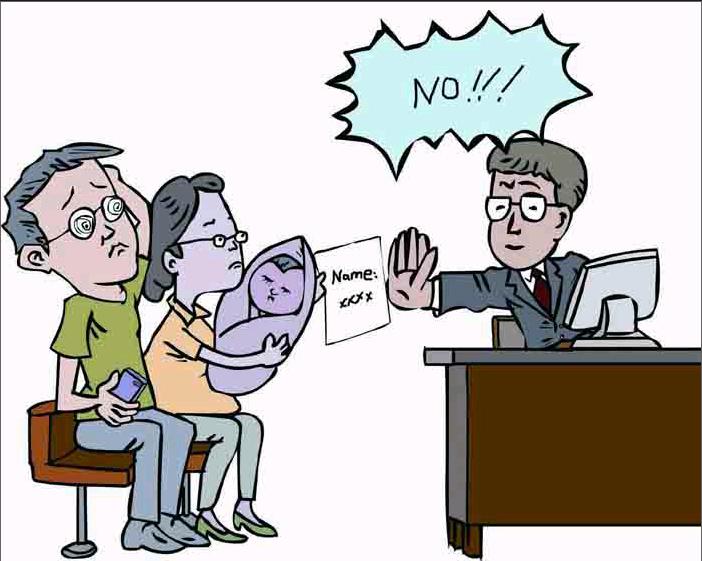Should There Be Legal Restrictions on Children’s Names?
2018-01-03

A recent spate of controversial names have steered public debate toward peoples rights when naming their children.
In 2009, a baby named “Beiyan Yunyi”(loosely translated as north-bound wild goose in the clouds) was denied household registration by the local residence authorities in Jinan, north Chinas Shandong Province, on the grounds that the baby did not inherit the family name. The enthusiasm for poetry of her parents, Lu Xiaofeng and Zhang Ruizheng, goes some way to explaining their unusual choice of name.
In December that year, the father, Lu, subsequently fi led a lawsuit with the Lixia district court of Jinan on behalf of his daughter, claiming that there should be no interference in her name. It was the countrys first administrative case related to the right to choose a family name. It was later submitted to the Supreme Peoples Court and the Standing Committee of the National Peoples Congress, the countrys top legislative body.
According to the Supreme Peoples Court, a person should be named in accordance with social ethics and parents should not create family names for children at will. The Marriage Law and the General Provisions of the Civil Law also stipulate that a person should be named after his or her parents. Exceptions include circumstances where one is named after another immediate family member or an adoptive parent, or when a surname other than that of ones parents is used for a “justifi able reason which is not against social and cultural customs.”
In 2015, the Lixia district court of Jinan cited this principle as the basis for rejecting the appeal of “Beiyan Yunyi” to be registered.
In fact, this is not the only instance of unusual names making the headlines in China. In September, a newborn went viral for being named “Wang Zherongyao,” or King of Glory, after a popular online game. A college student in Chongqing also gained momentary fame for being called “Huang Pujunxiao,” Chinese for the Whampoa Military Academy, the fi rst modern military school in China. The students father told the media that he named his daughter so because he hoped she would become a soldier.
Recent years have seen a steady rise in names considered by some to be unorthodox or strange, as those born in the 1980s and 1990s become parents and draw on their own experiences of modern culture when naming their children. These names are not only the source of interesting public debate but in some cases even challenge Chinese traditions and in the most extreme situations encounter problems with the law.
Not a game
Zhang Guifeng (The Beijing News): Whilst the freedom to name ones children should be stressed, parents should also think of the consequences of selecting this or that name. Names are used to distinguish a person from one another, so if a child has been named for a popular online game, the function of that name is thus weakened. While the name belongs to the child, it mostly serves for others to use. If ones name is the source of inconvenience, then the bearer of this name will in turn suffer. True, a child can decide to change his or her name when he or she grows up, but in this era of information, a lot of things related to this name will have to be replaced by new information. Thus, parents must be careful when selecting names for their children.
Zhang Peiyuan (Jiaxing Daily): It is with names that parents pin their great hopes and aspirations for the future onto their children. Since ancient times, the Chinese have been very serious about the naming of their offspring. Names that are easy to read, sound good and have a positive meaning are always good choices.
However, recent years have seen an increase in unorthodox names. Some parents seem to behave capriciously in the naming of their children, with some so bizarre that even school teachers have to fi rst consult a dictionary before daring to pronounce them, and local police stations in some cases refusing to register them.
Names are labels for people, but they are also a significant gift from parents to their children. A strange name might blight a child for his or her whole lifetime. If parents really mean well and want a good future for their children, why do they choose to name them in this way?
Tolerance needed
Jiang Meng (www.people.com.cn): In China, peoples names usually reflect the historical trends of the time when they received that name. For example, many of those who were born in the 1950s and 1960s were given names with contemporary meanings, such as “Jianguo” (building nation), “Aihua”(loving China) and “Yuanchao” (supporting North Korea). These were regarded as good positive names, and are a refl ection of what society considered valuable and important at that time. However, these names are considered outdated nowadays. Even at the time, confusion would often arise because so many people shared the same names. Even so, people did not rush to change their names, since names are vessels of historic memory and once a person gets used to a name, the names function as a label is more important than anything else.
Today, some young parents like to use strange, even bizarre names for their children. This is but a refl ection of this era, where people are eager to show their personality, to attract others attention and to pursue individual freedom. Such an attitude should not necessarily be criticized.
Take the case of “Wang Zherongyao”for example. This name will also become out of date one day, supplanted by newer and more fashionable names in the future, but it is not improper in principle. The childs family name is also Wang, and so since it is compatible with current legislation, “Wang Zherongyao” could be registered as a name even though it is very uncommon.
Nowadays, people tend to be more open-minded than in the past, so they wont be surprised by a name like this. Thus, there should be no fi xed criteria on names. As long as they are not actually in breach of ethics and meet the standards of Chinese characters, we should show tolerance toward them.
A balancing act
Gu Jinhao (www.nen.com.cn): Why was the name “Beiyan Yunyi” rejected to be registered? The offi cial explanation is that according to the Marriage Law and the General Provisions of the Civil Law, the child was not named for her parents, nor an immediate family member and without any valid alternative justifi cation. Simply put, it means that “Beiyan Yunyi” did not take her parentsname, therefore contravening the law and negatively impacting society.
However, this explanation seems contradictory. On the one hand, the law grants citizens naming rights where they are appropriate, permitting parents to name their children, but on the other imposes judicial restrictions on these rights. More importantly, the defi nition of “appropriate” here is vague.
The current dispute on name rights reveals deficiencies in the current law, which not only confuses the public but also affects the publics personal freedom and interests.
Citizens do enjoy the legal right to name their children, but this right is not unconditional. Children do not belong to their parents. Its improper to cause trouble to the whole society just because of parentspersonal preference for a particular unusual name. When individual freedom runs counter to public interests, laws are in place to first protect the public. In my opinion, the law needs to strike a balance between protecting peoples personal freedom and the public interest of society.
Zhu Yonghua (Hunan Daily): In accordance with the principle that the absence of legal prohibition means freedom, the name “Beiyan Yunyi” should be permitted. However, the name was rejected for household registration after the relevant authorities cited the Marriage Law as their reason. Actually, in this case, neither side is persuasive enough.
Parents do have the freedom and right to select names for their children, but this freedom is limited within certain legal boundaries, which means parents should refrain from being too whimsical when choosing names.
Apart from the involved government departments, Internet users also expressed their opposition to Lus choice for his daughters name. They accused him of being too unprincipled, lacking respect for traditional culture and potentially creating problems for his daughter in the future.
Fundamentally, names are a label for people to be used by others to distinguish us one from one another, whilst also allowing us to organize, manage and navigate our social affairs.
The name “Beiyan Yunyi” was rejected by local public security authorities for household registration on the grounds that it defi ed traditional culture and undermined effective social management. However, it was only in the context of household registration, a legal procedure that the relevant authorities decided to interfere with it. If Lu can try to understand the problem from this perspective, I think he is less likely to complain about the courts verdict.
